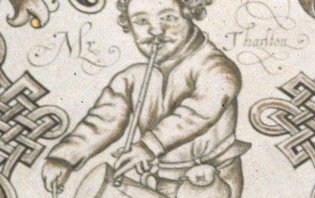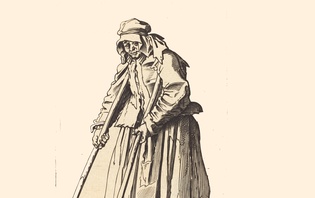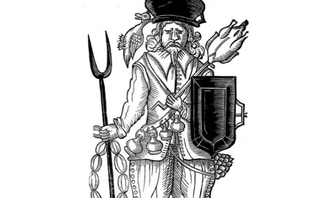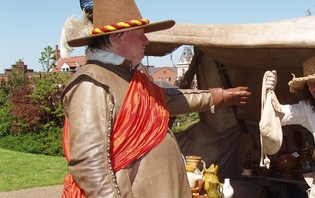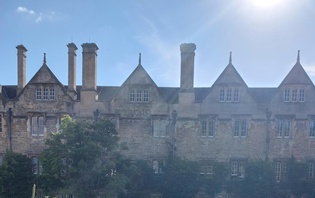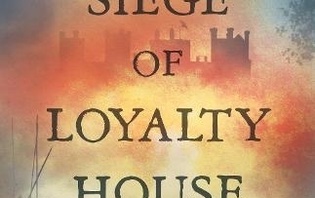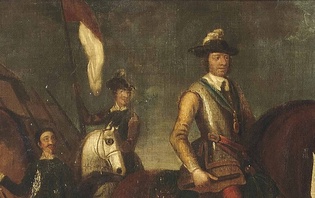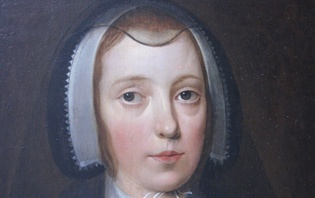‘And they called for their pints of beer and bottles of sherry…’: veterans and war widows as brewers and alehouse-keepers.
Beer was a staple drink for men, women and even children in early modern Europe, as it was far less likely to be contaminated than water. In our latest blog, David Appleby uses cases from the Civil War Petitions database to show how and why many impoverished military veterans, maimed soldiers and war widows brewed beer and ran alehouses, and how they fared at the hands of the county benches before and after the Restoration.
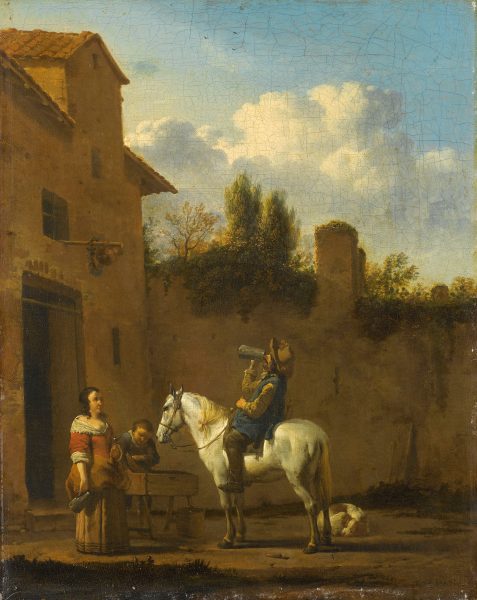
Mounted Trumpeter taking a Drink by Karel du Jardin c.1650 – 1660 (image from the Rijksmuseum, reproduced under a Creative Commons licence).
No Interregnum regime sought to impose a complete prohibition on the production and consumption of alcohol, not least because beer was safer to drink than water. Sobriety featured prominently in the Puritan agenda of the 1650s known as the ‘reformation of manners’, but Puritans were not alone in detesting drunkenness and carousing. Neither were Cromwell’s major-generals the first officials to crack down on unlicenced or disorderly alehouses: Assize judges had already conducted two energetic campaigns to close unlicenced establishments and reduce the number of licenced ones during the period of Charles I’s personal rule, in 1630-1 and 1637.
The various statutes and proclamations issued in the decades before the Civil Wars had caused considerable confusion as to who had oversight of alehouses, inns, and taverns, and a blurring of distinctions between these various establishments. Inns provided accommodation and victuals as well as drink, but increasingly alehouses were also expected to provide at least some accommodation in order to qualify for a licence. James I had attempted to increase Crown revenue by first franchising the right to license inns, and then alehouses. The disputes and tensions which subsequently arose in Charles I’s reign between these national franchises, Assize judges, county justices, manor courts and parish officers resulted in huge variations in the policing of alehouses, and erratic responses to the crackdowns periodically ordered by higher authority.
Attitudes to alehouses were ambivalent. Since Tudor times they had been ‘regarded by many in authority as a leading cause of poverty – places where working people frittered away their earnings on drink and gambling’ [Briggs et al (1996), 48]. There is no doubt that many alehouses were hives of disorder, prostitution, crime, and even sedition. Ever since Edward VI’s reign, those seeking a licence to run an alehouse had been required to deposit the sizeable sum of £10, with two supporters advancing an extra £5 each, as surety for keeping good order in and around their premises. Some county benches demanded even larger sums [King (1980), 41-2]. At the same time, it was widely recognised that the production and consumption of beer and ale were vital to the health of the local economy; an important consideration for communities struggling to recover from the Civil Wars. Fines levied on disorderly alehouses went towards poor relief; and many individuals who might otherwise have been a burden on the parish were able to subsist by keeping an alehouse. Inevitably, a large proportion of these people were too poor to afford the £10 surety and so operated without a licence. Many other poor people scratched out a living by illegally brewing in their homes to supply neighbours and local establishments. By contrast, maltsters tended to be relatively well off, as malting required significantly more capital than brewing or alehouse keeping (not least for the bulk purchase of grain), but their industry still provided gainful employment for the local poor.
Maimed soldiers and war widows were among the poorest members of local society. The vast majority of those awarded pensions barely received enough to subsist, and those denied pensions endured an even bleaker existence. As discussed in an earlier blog, many other veterans and widows attempted to shift for themselves rather than apply for charity. Examples in the Civil War Petitions database include John Hall, who petitioned to be allowed to work as a cobbler in Leicester, despite having lost the use of his right hand. Given that brewing and alehouse-keeping involved less physical exertion than many other occupations, it is unsurprising that some veterans and war widows should have chosen to supplement their meagre income in this way.
Some veterans petitioned for alehouse licences rather than pensions. William Parker of Beaulieu requested an alehouse licence from Hampshire justices in 1655, citing the wounds he had received in Parliament’s service. In May that same year, the parishioners of West Rudham in Norfolk stressed that Thomas Holman had been so badly afflicted by his military service that he was ‘very unable to work as other poor men to get his living’. They asked that Holman therefore be permitted to ‘draw beer as he has formerly done there five or six years.’ Robert Hansen informed the Lancashire bench in 1656 that he had lost his original livelihood during the four years he had served the Commonwealth in Scotland. He pleaded that ‘having a wife and child to maintain and nothing wherewith to maintain our livelihood withal, I humbly desire your licence to sell ale or beer in Rochdale’. The following year Alice Tarbock, a war widow, also petitioned the Lancashire bench, suggesting that if the justices chose not to give her a pension, they might at least grant her a licence to brew or sell ale in Ditton. Either outcome would allow her to support her three children, for ‘otherwise’, Alice warned, ‘she must be forced to put them upon the parish’. For whatever reason – very possibly because they had been particularly assiduous in closing alehouses during the 1650s – the Lancashire justices took a third course, ordering the churchwardens and overseers of the poor for the parish of Preston to make suitable provision for the Tarbock family.
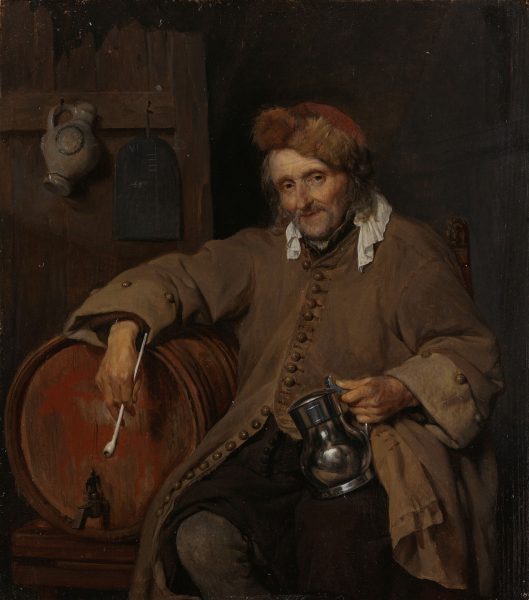
The Old Drinker by Gabriël Metsu, c. 1661-3 (image from the Rijksmuseum, reproduced under a Creative Commons licence).
The vague wording of the various Ordinances and Acts concerning maimed soldiers and widows left justices considerable discretion in allowing pensioners to supplement their pension with paid employment. Many magistrates appear to have disapproved of the practice. On receiving reports from informers in 1652 that some of their pensioners had jobs on the side, the Staffordshire bench declared that individuals healthy enough to work were taking money from more needy and deserving cases [Staffordshire Record Office, Q/SO/5, fols. 417, 463]. When Gloucester’s Midsummer Quarter Sessions convened in 1657, justices proposed to raise Samuell Pitt’s pension from £3 to £4 per annum but stipulated that the veteran was ‘not to receive any payment until he has stopped selling ale and beer’. The same attitude was evident after the Restoration: Northamptonshire officials investigating Thomas Roodey’s application for a pension in 1668 concluded that the royalist veteran was a fit candidate for financial relief, ‘except his keeping an alehouse’. However, the officials were satisfied that ‘he will lay aside that calling rather than lose his pension.’
A constant refrain running through all the licensing laws was that persons applying for alehouse licences should be well disposed to the State, and morally fit to run a drinking establishment. After 1649, with licensing powers bestowed unambiguously on county justices, such attributes were even more important to a Commonwealth regime obsessed with the related evils of drunkenness, disorder, and sedition. Consequently, it is interesting to see military service offered as evidence of good character, particularly during the rule of Cromwell’s major-generals. Thomas Crocker of St James, Somerset, was even more explicit than William Parker and Robert Hansen in presenting himself as ‘ever faithful and serviceable unto the State’. Crocker declared that his wounds had left him ‘totally maimed and consequently forever disenabled to get maintenance for himself, his wife and three children.’ The parliamentarian veteran explained that because ‘he could not labour and had no other way to get maintenance, he formerly used to sell beer in his dwelling house.’ Nevertheless, although pointing out that he had not hitherto been prosecuted for any disorder in all the time he had run his unofficial establishment, ‘your petitioner (as he understands) is now indicted for the same, whereby he is likely to be undone unless your Worships be now pleased to extend the eye of pity and compassion towards him.’ Frustratingly, there is no record to indicate how the Somerset bench responded to Crocker’s petition.
Sometimes it only required one accuser to prevent the renewal of a licence. Lieutenant Henry Fielding had died during the First Civil War, leaving his wife Grace Fielden (or Fielding) with very little means to sustain their large family. Consequently, for her ‘better livelihood and subsistence’, Grace had subsequently kept an alehouse with the blessing of her neighbours (her petition was endorsed by no less than 24 parishioners). This harmonious state of affairs continued until 1658/9, when one individual ‘did lay such foul aspersions upon me, especially at the last Privy Sessions held for the division of Blackburn hundred, so as by no means I could procure [a] licence to keep ale as formerly I had’. Grace’s obvious indignation at these ‘foul aspersions’ suggests that her detractor may have accused her of running a brothel (many alehouses were closed for allowing prostitution on the premises). She presented herself before the Lancashire bench in 1659 to clear her ‘good name and fame’. Significantly, in her effort to regain her reputation and be considered a fit and proper licensee Grace laid great stress on her status as a war widow, and the fact that some of her sons were now soldiers in Parliament’s service.
The question of allegiance figures prominently in the respective cases of Thomas Holte and Mary Allin, but for very different reasons. Thomas Holte of Liversedge in the West Riding of Yorkshire had plainly served as a parliamentarian soldier, as he was granted a pension in July 1646. He appears to have been given considerable latitude to supplement his income, for he is described as a butcher and alehouse keeper in a later document in 1648. However, this document also records that on 13 July 1647 he had called for a health to be drunk to the confusion of Parliament ‘and all that took their part’, and had threatened to kill a customer, calling him ‘Roundhead Reyner’. West Riding justices stripped Holte of his pension and his alehouse licence. Curiously, he is once again recorded as a pensioner after the Restoration, despite the fact that the 1662 Act specifically precluded those who had been in arms against Charles I or his son. Holte’s case contrasts with that of Mary Allin, a widow from Pilton, Northamptonshire, who had completely the opposite experience after the Restoration when her brewing licence was revoked by the county bench in 1667. The certificate submitted by her supportive neighbours (including Pilton’s overseer of the poor, the petty constable, and a churchwarden) laid great stress on the fact that her husband had served as a surgeon in the royalist army, and that the loss of the veteran’s pension following his death had left the Allin family in poverty. Intriguingly, the certificate also inadvertently disclosed that the couple had been allowed to brew beer and run a licenced victualling house throughout the Interregnum, despite the husband’s royalist background. This was almost certainly because they had ‘always carried and demeaned themselves civilly, orderly and handsomely towards all people, and have done much good to diverse lame and distressed people by their very good skill in surgery.’ Like Grace Fielden, Mary Allin had been accused by a disgruntled individual. Her neighbours described the allegations as ‘utterly false and untrue and maliciously done’. The loss of the alehouse licence had been ‘to the great hinderance and amazement of the poor widow and her great family of small children, they not imagining any cause wherefore.’ Again, despite the fact that Mary Allin’s case was considered at the Epiphany Sessions of 1667/8 and again at the Easter Sessions of 1668, there is no indication as to whether Northamptonshire justices restored her licence.
This blog shows yet again how the huge collection of records held in the Civil War Petitions database has the potential to shed light on a wide range of societal and political issues beyond military welfare and war relief. Inevitably, the blog must end with many questions: for example, how many other maimed soldiers, veterans and war widows brewed beer illegally or kept unlicenced alehouses, but managed to avoid official scrutiny? Did county benches turn a blind eye to such activities in order to mitigate the burden of war relief in the localities? If so, were Restoration benches more tolerant than those which functioned during the Interregnum? Hopefully, someone reading this blog will be enthused to delve further into the archives in search of answers.
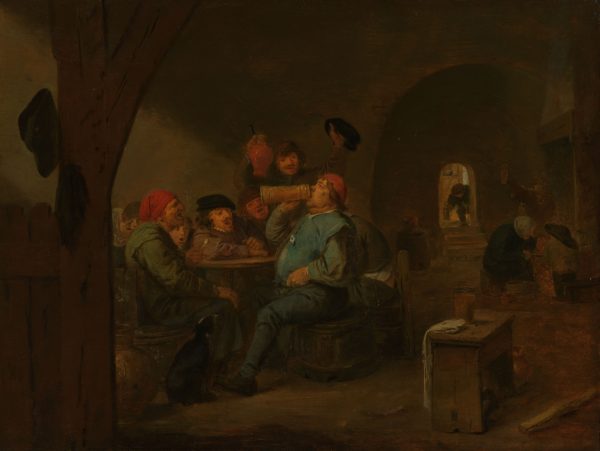
Drinking Bout in a Tavern, after Adriaen Brouwer c. 1700 (image from the Rijksmuseum, reproduced under a Creative Commons licence).
Further Reading
John Briggs, Christopher Harrison, Angus McInnes and David Vincent, Crime and Punishment in England: An Introductory History (London, 1996).
Mark Hailwood, Alehouses and Good Fellowship in Early Modern England (Woodbridge, 2014).
Judith Hunter, ‘English inns, taverns, alehouses and brandy shops: the legislative framework, 1495-1797’, in Beat A. Kümin and B. Ann Tlusty (eds), The World of the Tavern: Public Houses in Early Modern Europe (Aldershot, 2002), pp. 65-82.
W. J. King, ‘Regulation of alehouses in Stuart Lancashire: an example of discretionary administration of the law’, Transactions of the Historic Society of Lancashire & Cheshire, 129 (1980 for 1979), pp. 31-46.
Stephen K. Roberts, ‘Alehouses, brewing and government under the early Stuarts’, Southern History, 2 (1980), pp. 45-71.
Keith Wrightson, ‘Alehouses, order and reformation in rural England, 1590-1660’, in E. Yeo and S. Yeo (eds), Popular Culture and Class Conflict, 1590-1914: Explorations in the History of Labour and Leisure (Brighton: 1981), pp. 1-27.

